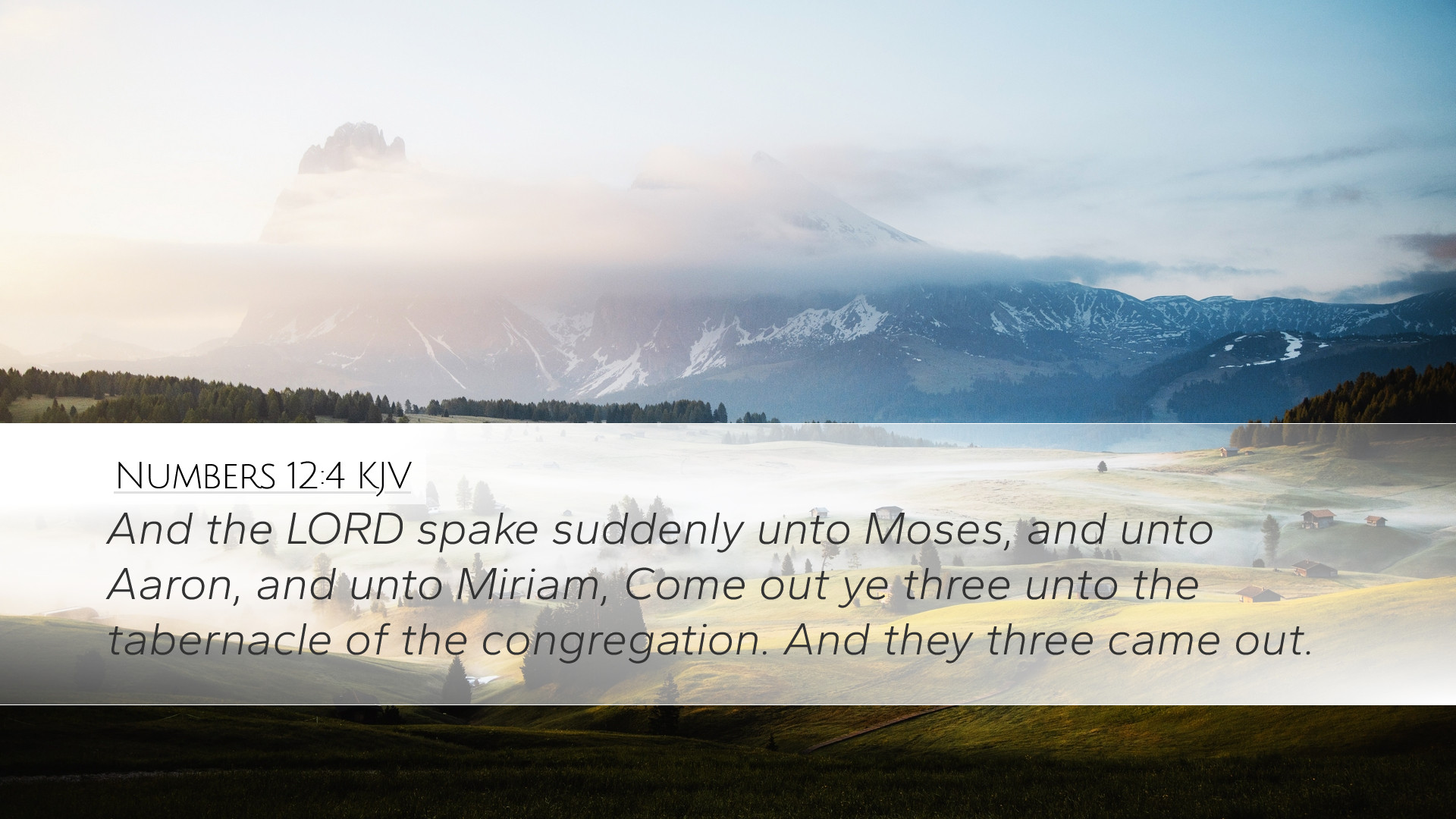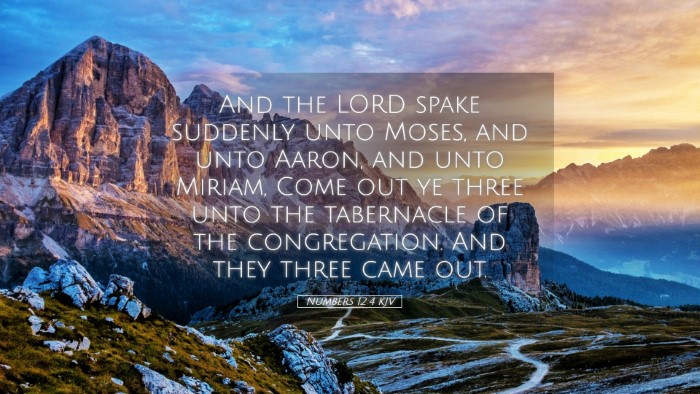Commentary on Numbers 12:4
Introduction
Numbers 12:4 presents a pivotal moment in the narrative of the Israelites' journey through the wilderness. The verse reads:
“And the Lord spake suddenly unto Moses, and unto Aaron, and unto Miriam, Come out ye three unto the tabernacle of the congregation. And they three came out.”
This verse introduces a divine summons that underscores the authority of God and the role of His chosen leaders. In this commentary, we will draw from classic theological insights, providing reflections that resonate with pastors, students, and scholars alike.
Divine Initiative
God Speaks Suddenly
As noted by Matthew Henry, the phrase “the Lord spake suddenly” signifies a moment of urgency and importance. God's sudden communication emphasizes His sovereignty and the need for immediate attention to His will. The swift call from God is indicative of the seriousness of the circumstances involving Moses, Aaron, and Miriam.
Implications of God’s Command
Henry elaborates on the divine nature of this command, illustrating that God often speaks in critical moments—not when it suits us but at the most opportune time for His purposes. This truth serves as a reminder to leaders and congregants alike that God's direction may come when least expected but must always be heeded with humility and reverence.
The Assembly
The Tabernacle as a Meeting Point
God’s call for Moses, Aaron, and Miriam to come forth to “the tabernacle of the congregation” hints at the sacredness of the space where divine communication occurs. Albert Barnes highlights that the tabernacle represents a place of reverence where God meets with His people. This locale is essential because it denotes a separation from the common and an entry into the divine presence.
The Significance of Unity
The fact that God summons the three leaders together is significant. As noted by Adam Clarke, their collective presence suggests that the matter at hand involves communal accountability. Clarke distinguishes that God addresses the trio to remind them of their roles and responsibilities as leaders. This gathering can be seen as a precursor to addressing the issues of pride and rebellion within their ranks.
Leadership Dynamics
The Roles of Moses, Aaron, and Miriam
In the context of Numbers 12, it is essential to recognize the dynamics of leadership illustrated by these three figures. Amy role within the Israelite community is distinct yet interconnected. Moses, as the prophet, is the mediator between God and the people; Aaron serves as the priest, representing the people before God; and Miriam, as a prophetess, offers not only leadership but also a voice of critical dissent.
Miriam’s Challenge
The call to the tent serves to address the growing discontent with Moses’ leadership, predominantly sparked by Miriam’s and Aaron’s challenge against him due to his Cushite wife. As Barnes states, this reflects the danger inherent in the leaders' personal grievances bringing division among the people of God.
God’s Response
Judgment and Restoration
The urgency of God's command is a prelude to issuing a judgment against Miriam and Aaron for their dissent. Matthew Henry emphasizes the immediacy of divine justice, considering how God's intervention is swift when His authority is disputed. This serves as a crucial lesson for all leaders regarding accountability to divine precepts.
Lessons in Humility and Authority
The ensuing events highlight the necessity for leaders to recognize their limitations and the authority of God in their lives. Clarke points out how God’s swift action serves as a corrective measure—not only for Miriam and Aaron but for the entire nation. The leaders must learn to trust in God’s appointed authority rather than fostering dissent.
Theological Reflections
God’s Sovereignty and Human Agency
This text prompts theological reflection on the tension between God's sovereignty and human agency. It raises questions about how leaders can align their actions with God’s will while navigating interpersonal conflicts. The call to the tabernacle symbolizes that, in moments of crisis, returning to the sacred space and seeking God’s counsel is paramount.
Application for Modern Leaders
For pastors and church leaders today, the lesson from Numbers 12:4 is clear: the importance of humility and the recognition that, while leaders may have authority, ultimate authority rests with God alone. The practice of seeking God collectively—as seen in the summons to the tabernacle—is indispensable for maintaining unity and purpose within the church.
Conclusion
Numbers 12:4 encapsulates profound truths about divine instruction, accountability, and the critical nature of leadership in the faith community. By examining the insights from Henry, Barnes, and Clarke, we are reminded of the overarching theme of obedience to God's will and the necessity of approaching Him in humility. Let every leader take to heart the summons of God, responding with readiness and a spirit attuned to the Holy Spirit's guidance.


